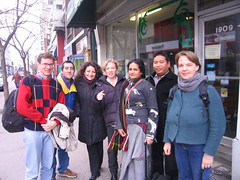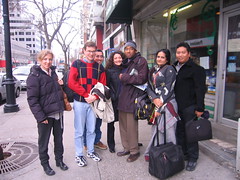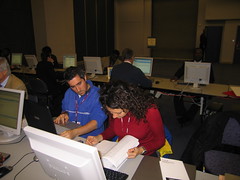Climate Justice Now!
| Factsheet of Extractive Industries in the Developing World
|
Friday, December 02, 2005 |
Dependency of some developing oil & gas producing countries to donor countries, which are home to the holders of capital in major mining, oil & gas corporations, has legitimated the former as loyal servants to extractive industries. In the case of Indonesia, for instance, the contribution to national income by extractive industries has been very low for four decades of their life in Indonesia. Even worse, the energy sector restructuring agenda adopted in Indonesia since 2000 cannot be separated from the loan scheme of the IMF and the World Bank, which has flooded the country with 260 million USD. The World Bank that supposedly aims to reduce global poverty has in fact been the biggest funder for extractive industries -- which are proven to increase global poverty.
One major problem in extractive industries that have never been successfully handled by neither state managers nor corporations are their wastes. The great risks and destructiveness due to oil & gas extraction have never been countered with policy to protect the security of people or their environment.
Extractive industries always involve human rights violations. There has never been any experience of peoples' lives in areas adjacent to extractive industries being protected by the state apparatus, since their lives are considered of less worth than the foreign exchange brought in by strategic extractive industries. Women in areas to extractive industries' operations are the most vulnerable.
by: ProfMKD @ 10:01 pm | 0 comments

| Raised Voices on climate and oil
|
One major problem in extractive industries that have never been successfully handled by neither state managers nor corporations are their wastes. The great risks and destructiveness due to oil & gas extraction have never been countered with policy to protect the security of people or their environment.
Extractive industries always involve human rights violations. There has never been any experience of peoples' lives in areas adjacent to extractive industries being protected by the state apparatus, since their lives are considered of less worth than the foreign exchange brought in by strategic extractive industries. Women in areas to extractive industries' operations are the most vulnerable.
Arief Wicaksono
Mobile: +6281319594585
Email: ariefw@indo.net.id
by: ProfMKD @ 10:01 pm | 0 comments
FIROZE FROM KENYA ON CARBON TRADING
We don't have a say in how they exploit the planet, we don't have say in how it's done. And if we did I think things would happen in a very different way. But there is this attitude that basically we've got to find a way to make these corporate entities nice. Some of these people that are running these companies are probably very nice people. But it's not because they are nasty that they do these horrific things to the environment, it's because it is highly profitable. And they get subsidised by you and I to actually make that profit. It's called development. That's what the name of the game is. I think we have to be really hard to say look let's look at why this is happening and it's happening because it is a profitable enterprise for people to exploit natural resources. I think a good example of the kind of contradictions people get into is this whole debate about carbon trading. It's absurd. Imagine if you said well okay this year New York only had X number of murders and in Nairobi they had Y number of murders. So Nairobi has under-killed this year so it can sell off how many people can be killed somewhere else. I mean it's absurd. It's not a system we can accept and I think some really hard talking needs to be done about this.
For more Raised Voices see www.raisedvoices.net
by: ProfMKD @ 2:29 pm | 0 comments

| Durban Group in Montreal
|
We don't have a say in how they exploit the planet, we don't have say in how it's done. And if we did I think things would happen in a very different way. But there is this attitude that basically we've got to find a way to make these corporate entities nice. Some of these people that are running these companies are probably very nice people. But it's not because they are nasty that they do these horrific things to the environment, it's because it is highly profitable. And they get subsidised by you and I to actually make that profit. It's called development. That's what the name of the game is. I think we have to be really hard to say look let's look at why this is happening and it's happening because it is a profitable enterprise for people to exploit natural resources. I think a good example of the kind of contradictions people get into is this whole debate about carbon trading. It's absurd. Imagine if you said well okay this year New York only had X number of murders and in Nairobi they had Y number of murders. So Nairobi has under-killed this year so it can sell off how many people can be killed somewhere else. I mean it's absurd. It's not a system we can accept and I think some really hard talking needs to be done about this.
For more Raised Voices see www.raisedvoices.net
by: ProfMKD @ 2:29 pm | 0 comments
Durban Group
(l to r): Larry Lohmann (Cornerhouse, UK); Ryan Hodum (SEEN, USA); Nadia Martinez (SEEN, USA); Daphne Wysham (SEEN, USA); Anastasia Pinto (CORE, India); Arief Wicaksono (Oilwatch); Jutta Kill (FERN, Germany/UK)
by: ProfMKD @ 9:14 am | 0 comments

| Durban Group in Montreal
|
(l to r): Larry Lohmann (Cornerhouse, UK); Ryan Hodum (SEEN, USA); Nadia Martinez (SEEN, USA); Daphne Wysham (SEEN, USA); Anastasia Pinto (CORE, India); Arief Wicaksono (Oilwatch); Jutta Kill (FERN, Germany/UK)
by: ProfMKD @ 9:14 am | 0 comments
(l to r): Daphne Wysham (SEEN, USA); Larry Lohmann (Cornerhouse, UK); Ryan Hodum (SEEN, USA); Nadia Martinez (SEEN, USA); Michael Dorsey (Dartmouth College, USA); Anastasia Pinto (CORE, India); Arief Wicaksono (Oilwatch)
by: ProfMKD @ 9:13 am | 0 comments

| Working on the Press Release
|
by: ProfMKD @ 9:13 am | 0 comments
Durban Group members Ryan Hodum and Nadia Martinez put finishing touches on the first climate justice press release:
http://www.seen.org/PDFs/Montreal120105pr.pdf
by: ProfMKD @ 9:12 am | 0 comments

http://www.seen.org/PDFs/Montreal120105pr.pdf
by: ProfMKD @ 9:12 am | 0 comments



